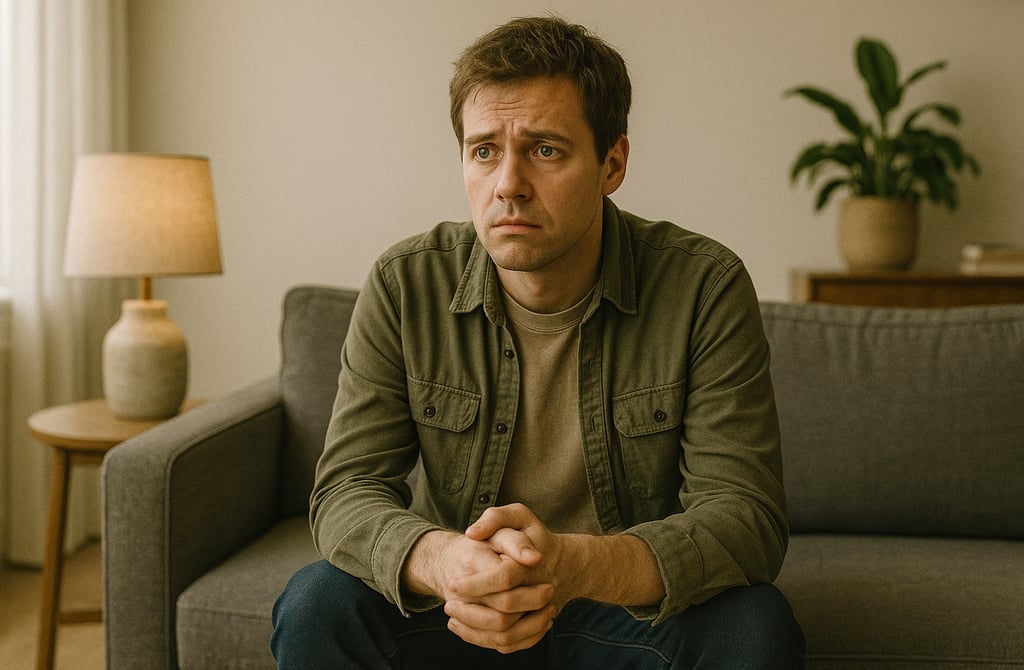The Waiting Room
A seasoned aid worker faces rejection and doubt, discovering that purpose isn't always found in doing, sometimes it's refined in waiting.
SOJOURNER
Wandering Armenian
10/27/20258 min read
The Waiting Room
"For I know the plans I have for you," declares the Lord, "plans to prosper you and not to harm you, plans to give you hope and a future." Jeremiah 29:11
The Waiting Room
Jonathan's fingers trembled as he opened the email. The subject line told him everything: "Re: Application Status." He didn't need to read further. This was the forty-seventh rejection in four years.
Forty-seven
He pushed back from the laptop and walked to the kitchen window, staring at the garden he'd meticulously maintained, another task to fill the endless hours. Twenty-three years in international aid work, and now this: dishwasher, gardener, job applicant, cook and Home baker. The titles felt like a cruel joke.
The house was quiet. His wife, Sarah, had left for work hours ago. Their sons, one was at university and the other overseas, he had just completed his university and was looking for work. And Jonathan-Jonathan was alone with his thoughts, which lately had become poor company.
He returned to his desk and pulled out the folder he kept hidden in the bottom drawer. Inside were letters, certificates, photographs and even some hand drawn sketches by children in camps, from two decades of fieldwork. There he was in up Sri Lanka after the distributing emergency rations after the tsunami. In Bangladesh, after the cyclone. In Greece, coordinating refugee camps. His younger self stared back at him from these photos-purposeful, needed, alive.
"Who am I now?" he whispered to the empty room.
The house seemed to answer with silence.
The Breaking Point
It was a Tuesday when Jonathan hit bottom. He'd spent the morning revising his CV for the hundredth time, trying to make twenty-three years of experience sound relevant, trying to hide the four-year gap without lying. The words blurred together.
He closed the laptop and put his head in his hands.
"God," he prayed, his voice cracking, "I served You. I fed the hungry. I clothed the naked. I did what You asked. And now... now I can't even get an interview for a junior position. What am I doing wrong? Have You forgotten me?" In fact he silently utters Psalm 102.
Tears came then, hot and unexpected. Jonathan, who had held it together through war zones and disease outbreaks, who had comforted grieving mothers and traumatized children, wept alone in his small, rented apartment hall.
When Sarah came home that evening, she found him still there, staring at nothing.
"Jonathan," she said softly, sitting beside him. "Talk to me."
"I'm useless," he said. "Four years, Sarah. Four years of rejection. I'm fifty-one years old, and I've become invisible. Everything I built, everything I was—it's gone."
Sarah took his hand. "You're not useless. You're my Jonah... You're Jaison's Papa Louie. You're…Joe’s Pa"
"A housewife," he interrupted bitterly. "I do laundry and cook dinner while the world moves on without me."
Sarah was quiet for a moment. Then she said something that surprised him: "Do you remember Mrs. Patterson from church?"
Jonathan frowned. "The elderly woman? What about her?"
"She told me last Sunday that you've been calling her every week. That you helped her set up her new phone. That you drove her to her doctor's appointment last month when her son couldn't."
"That's nothing," Jonathan said. "Anyone could do that."
"But you did it," Sarah replied. "And she told me it saved her life. Not metaphorically, Jonathan. She was thinking of ending it all. She felt forgotten. And then you showed up."
The Shift
Jonathan couldn't sleep that night. Sarah's words echoed in his mind. He thought about Mrs. Patterson, a phone call he'd made out of boredom, really. A distraction from his own despair.
He thought about the other things he'd done to fill time: mentoring some immigrant kinds at the Library in English, volunteering at a food bank once a week in his locality, listening to his neighbour Marcus talk about his divorce over the fence.
None of it felt like his old work. None of it felt significant.
But what if it was?
The question unsettled him. He rose from bed and went to his study, pulling out his old journal from his fieldwork days. He flipped through pages filled with meeting notes, setting up annual procurement plans, logistics, and crisis responses. But then he found something else entries he'd forgotten.
March 15, 2008, Darfur: Today wasn't about the numbers. It was about the woman who thanked me for remembering her name. In all the chaos, that small recognition meant everything to her.
June 3, 2012, Haiti: Spent an hour just sitting with a man who lost his family. Didn't distribute aid. Didn't coordinate anything. Just sat. He said it was the first time someone had stopped moving long enough to see him.
October 21, 2016, Greece: The work is overwhelming. Sometimes I wonder if we're making any difference. Then a Yemeni child smiled at me today, and I remembered, we don't always see the impact. We just have to show up.
Jonathan closed the journal slowly. He'd been measuring himself against the wrong metric. He'd been counting job offers and project budgets when perhaps God was counting something else entirely.
The Revelation
Three weeks later, Jonathan received another rejection email. But this time, something had shifted inside him.
Instead of spiralling into despair, he got dressed and walked to the community centre where he'd recently started teaching free baking classes to refugee’s adolescent kids twice a week. It had started small-just three students. Now there were fifteen.
A young Syrian man named Karim approached him after class. "Mr. Jonathan," he said hesitantly, "I want to thank you. I got the job. The one I interviewed for. They said my English and dough kneading was good enough."
Jonathan felt something crack open in his chest. "Karim, that's wonderful. I'm so proud of you."
"I couldn't have done it without you," Karim continued. "In Syria, I was a cleaner. Here, I was nothing. You made me feel like someone again. Like I had something to offer."
“All Glory to God, Karim Jan,” I told him. After Karim left, Jonathan sat in the empty classroom. He thought about his own words to Karim over the weeks: Your worth isn't defined by employment. Your experience matters. Don't give up.
How easily he could give advice he struggled to accept for himself.
His phone buzzed. A text from Marcus next door: Hey man, thanks for listening yesterday. Talking to you helped more than my therapist. You should charge for this! 😊
Then another message, from the food bank coordinator: Jonathan, the family you helped last week asked about you. The father said you were the first person who didn't make him feel ashamed for needing help. That's a gift.
Jonathan stared at his phone. Somewhere between the rejections and the waiting, between the dishwashing and the phone calls, he'd been serving. He just hadn't recognized it because it didn't look like the work he used to do.
The Understanding
That Sunday, Jonathan sat in church with new ears. The pastor was preaching about seasons. He has recently made some friends who had invited him to their church.
"We often think of wilderness seasons as punishment," the pastor said. "But what if they're preparation? What if God is stripping away our old identities so we can embrace something new?"
Jonathan thought about Moses-forty years in the desert before his life's greatest work began. About David-years running from Saul before becoming king. About Jesus himself- thirty years of obscurity before three years of ministry.
What if these four years weren't wasted time? What if they were necessary?
"God's plans aren't always about doing more," the pastor continued. "Sometimes they're about becoming more -more compassionate, more humble, more dependent on Him."
Jonathan felt tears on his cheeks again, but this time they weren't from despair.
The New Beginning
Jonathan didn't suddenly get job offers. His circumstances didn't magically change. But something inside him had transformed.
He started a blog about food, how it connects to scripture, daily life transitions and identity, sharing his journey honestly- and he titled it as “CrumbsnWonders”. It resonated with others in similar situations-people who felt discarded by the job market, people struggling with purpose after career changes or retirement.
He expanded his refugee classes and connected with local organizations. He continued calling Mrs. Patterson, who introduced him to other isolated elderly people. He started facilitating a men's support group at church for those facing unemployment.
One evening, six months after his breakdown, Sarah found him in the garden, and she noticed something different-he was humming.
"You seem lighter," she observed.
Jonathan nodded. "I think I'm beginning to understand. I kept asking God to give me back my old life, my old purpose. But maybe He's been showing me a new one all along. I was just too busy looking backwards to see it."
"And now?"
"Now I'm learning to serve where I'm planted. Even if it's not what I planned. Even if it doesn't come with a title or salary. Even if no one's watching."
Sarah smiled. "That's the Jonah or Jonathan I married twenty-three years ago. The one who served because he believed in it, not because someone paid him to."
The Letter
A year later, Jonathan received an email. But this time, it wasn't a rejection.
A small nonprofit focused on supporting aid workers through career transitions wanted to hire him as a program director. They'd found his blog. They'd heard about his classes. They wanted someone who understood both the field and the struggle.
Jonathan stared at the offer letter for a long time.
A year ago, this would have felt like vindication-proof that the waiting was over, that he was valuable again.
Now, it felt different. It felt like confirmation of something he'd already learned: his value had never been tied to employment. His purpose had never left. It had simply transformed.
He accepted the position, but not because it defined him. He accepted it because it was another way to serve, another opportunity to walk alongside people in their wilderness seasons, to be the voice that reminded them they weren't forgotten.
Epilogue
Jonathan still does the dishes. He still tends the garden. He still calls Mrs. Patterson every Tuesday. He still teaches baking to the immigrant kids on weekends.
But now he understands these weren't distractions from his purpose. They were expressions of it.
Purpose isn't always loud. It isn't always impressive. Sometimes it's found in the quiet faithfulness of showing up, day after day, whether anyone notices or not.
The waiting room had felt like punishment. But it had been a classroom-teaching him that his worth wasn't measured by organizational budgets or project outcomes, but by the kingdom work that happens in small moments of connection, compassion, and presence.
God's plans hadn't disappeared during those four years. They'd been working beneath the surface, transforming Jonathan from someone who served because it was his job into someone who served because it was his identity.
The rejection letters are still in his drawer. He keeps them as reminders-not of failure, but of the season that refined him, the waiting that wasn't empty, and the God who never once looked away.
In the waiting room, Jonathan discovered what he'd been missing in all his years of important work: the sacred ministry of simply being present, of seeing people others overlooked, of offering himself without agenda or acclaim.
And in that discovery, he found what he'd been searching for all along-not a job, but a calling that could survive any season, any circumstance, any silence.
Because true purpose doesn't depend on external validation. It grows from the inside out, from a heart surrendered to whatever comes next, trusting that even in the waiting-especially in the waiting, God is drafting a story worth telling.



